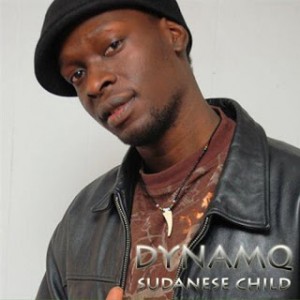River Nile Entertainment
South Sudan Artist Dynamq promotes Ruka Muzik- new music genre
By Sudan Returnee
His name is Kennedy Ong’ele Lorya but is known as ‘Dynamq’ (pronounced Dynamic). He was born in Juba, Sudan and is now based in Atlanta.
Dynamq Lorya appears to have found a name for his unique style of music, and his fans are pouring in their ‘likes’ and support.
Ruka Muzik, according Dynamq aka Sudanese Child, is the style that identifies his music. It is a mix of dance-hall, zouk, R&B and Soukous.
“l started Ruka Muzik about two years ago and prior to that l was in search of a sound that fitted me. I found it when l wrote the song Kalamat deh wosulu,” he says
“Most of athletes like to listen to music when warming up for a big races but for me i like RUKA MUZIK by Dynamg Lorya. I Support RUKA MUZIK” – Sudanese – born US Athlete Lopez Lomong declares.
Ruka Muzik has been getting lots of support and has taken me all over the world – Australia, Finland, Germany, France, Belgium, Canada, several states in the US, just to name a few.”
Dynamq sings in English, Swahili and Juba Arabic, a lingua franca spoken mainly in South Sudan.
Along with other renowned South Sudanese artists like Emmanuel Kembe, Yaba Angelosi, Sultan Clintone and Emmanuel Jal, Dynamq is among the few South Sudanese artists who have succeeded to gain international recognition and respect. He has won several awards, and all indicators show the world has not seen the best of him yet.
The Dynamq Sound of South Sudan – An insightful interview with Assumpta Ozua
Firstly, how did you get the name Dynamq?
The name ‘Dynamq’ was a nick name given to me by my friends on the football field. It really got big after doing a sound check once and my voice was so strong on the mic that my friends kept saying my voice sounded dynamic, so that’s how it picked up.
I read that your family fled to Kenya when you were quite young. How would you describe your upbringing?
It was a struggle. I lost my father and my brother when I was young. From what my family has been through, I truly appreciate life. My mother was the only survivor after a horrific plane crash in Sudan which is what led to us moving to Kenya as that was the only place where she could get adequate hospital treatment. I was lucky enough to have a father who was educated and had a little money behind him. My mother was in hospital for three years! We were only able to leave Sudan because my father paid a visiting Church from Norway, and they helped us [me and my two younger sisters] to leave the country. My two older brothers had to stay to look after other family members who lived with us. My two older brothers eventually joined us five years later but, one of them got sick and died. It was after my brother died, that I started listening to music a lot. It relaxed me. My youngest sister (Veronica) never got to meet my brother who died so she used to ask us about him a lot. We were the first Sudanese people to move to Kawangware. Any disrespect that you can imagine, we got it from the Kenyan’s. But my parents always tried to keep us strong. Sadly a few years later my father died and that’s when everything went wrong because my mother was not educated past the 8th grade.
What was it like for you surviving life in the refugee camp?
[laughs] The refugee camp was no joke. When you woke up, you would have to go out and look for food. The United Nations only gave us one meal a day. It was there that my love for music started picking up even more. There was a Sudanese guy who came from India with a three stringed guitar and I used to sit and listen to him play. We used to sit and read newspapers that were 5 years old just so that we wouldn’t forget how to read!
How would you describe yourself?
I am a people person. I was very hard headed. One of my favorite musicians back then was Ras Kimono and I used to listen to a lot of his music.
How did you eventually end up in America?
Through a refugee resettlement program. You applied through the UN. Not everyone got chosen – they picked a name at random. Once you got on it, you could apply for your immediate family to come and join you. My brother was chosen and then he applied for us to join him.
Out of every career path you could have followed, why did you choose music?
Music is the only thing that unites my people. In South Sudan there is a lot of tribalism and what music does it makes everyone dance. It makes a lot of people think too.
What inspires you and your music in general? Is it personal experiences or just what you see around you?
Personal experiences, what I see around me. One thing I really dislike is African women still being treated like they are nothing. Not only African women but women in general. I love my mother so much. I just feel like – women really motivate me a lot. I cannot say I know exactly what women go through but I can try to understand because I grew up with my mother and four sisters. Seeing Kawangware, Nairobi, America and how beautiful they are inspires me and wondering what it would be like if Sudan were like that one day? Also life itself inspires me.
I hear that Wayne Wonder is your mentor, how did you meet him and how did he end up being your mentor?
I’ve always been a fan of Wayne Wonder. I used to DJ and used to perform on sound systems back in Kenya – just for fun. I would always outshine the artists on the flyers because I would just vibe with the crowd. I got a chance to meet Wayne Wonder in Houston, Texas at a DJ called Bronco’s birthday. He’s a down to earth person and asked me a lot about Africa. I started sending him my music and he started listening to it and he’d call me back and tell me what I could do differently. We’ve just been friends every since then.
You’ve just finished your new album – how would you describe its sound?
It’s a mixture of reggae. I have some acoustic fusion kinda sound. I was very fortunate enough to do a song with Erica Newell called ‘Mama’ and a song with my cousin. I got the chance to work with Hakim (of Sunland Music). He produced the song ‘Mama Africa’ for Akon, he’s also produced for New Kids on the Block, Youssou N’dour . He’s produced three tracks for me and I produced the rest.
What was touring like?
It has its ups and downs. The one thing I dislike about it is staying away from my family. I’ve toured all over America and Canada.
Do you prefer live performances or studio?
There’s nothing like a live performance. Live performances are the best.
What or who, inspired the song ‘Nobody’?
[laughs and breaks into song] At the time I was dating a certain individual and we went to the club and saw one of my friends who was going though a lot with his girl. The song was number 1 in Bermuda for six months. It’s amazing because Sudanese people did not even know about the song. Even till today, a lot of Sudanese people meet me and don’t think I’m Sudanese until I start speaking Arabic to them.
Do you often get recognised?
Well, first of all, I’m like the most laid back person. Whenever I go to Sudanese events, people recognize me. When I go to Caribbean events, DJ’s recognize me and then the crowd will be like “oh that’s him”.
Tell us a little about your record label: River Nile Ent.
It’s more of a record label slash production company because I can play four instruments. So I thought I would start something to enable me to help people. I really want to help a lot of young musicians to put their music out there because I know I went through hell in the beginning. I started River Nile Ent with my childhood best friend Hubert Luka – but his nick name is Loro.
Would you like to work with any other Sudanese artists or meet any other Sudanese Diaspora?
I have met Emmanuel Jal – he’s a friend of mine and I’d definitely want to work with him. I like his style. I also want to work with Omar Hisas from Dafur. When we did the Sudanese artists on tour here in America, he was my roommate. I didn’t know he was such a legend until I googled him and went to YouTube. I’m always open to work with anybody whose down for anything positive because I’m all about uplifting humanity.
Finally, would you prefer critical acclaim or commercial success?
[laughs] If I ever make it to the commercial level, I’m still not going to change who I am. Critical acclaim would be nice. I definitely want to do my thing for the people. I don’t want to be commercialized.
Finally, where can people find you?
You can purchase Dynamq’s album ‘The Sudanese Child’ on iTunes and at his shows.


